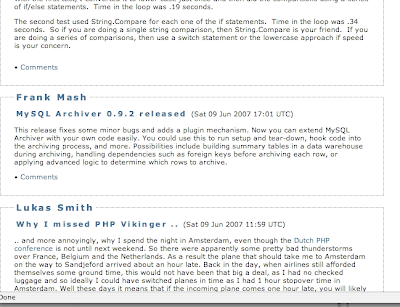DISCLAIMER (and yes, it's a long one):
Over the years, I have come to love MySQL. I have many friends, colleagues and peers that depend on MySQL in one way or the other to make their living. Friends whose lives and passions revolve around MySQL. Friends who want to change the world (with MySQL). Friends who want to take MySQL to the next level.
I am so fascinated about MySQL's business that when I first received a call for comments that MySQL is re-launching MySQL Enterprise by dividing the development tree, I felt very happy. I had been a part of various conversations by then debating whether a company should invest in MySQL Enterprise. My view was: if you're a tad bit serious about your business or product, you need MySQL Enterprise. For businesses of all sort, that's an investment, which actually has the potential of lowering TCO (yes, I believe so). I remember saying that, in many ways, branching off the development tree is a great idea as it will help define the Enterprise "product" and make the decision making process easier for CIOs, CTOs, DBAs and other decision makers involved in the process.My good friend, Jay who organized the very excellent MySQL Conference this year, wrote about his
top 5 wishes for MySQL. Jay also managed to get the Top 5 Wishlist of our favorite
CEO. Several others on Planet are writing theirs, so here is mine.
My personal wishes aren't just about MySQL software since my involvement is more than the general role of a DBA. I do NOT want this to sound like anything other than what it is: my personal wish list based on my experience of becoming a MySQL customer.
1.
Integrated Backup Solution: Enough said!
2.
Open Marketing for an Open-Source Company: I wish MySQL would
tell customers about products/services that are just about to launch.
What? or more importantly, Why?
I am always surprised by entrepreneurs who would use MySQL, but not pay for support. So naturally, I made a case for MySQL to my boss. We signed up though there seemed to be a sense of urgency. Then within weeks, MySQL Enterprise Unlimited was launched. Sad part is that no offer was made to newly acquired customers on how to take advantage of this. Actions like these have the potential to turn even a company's most loyal customers with a bad taste in their mouth.
When I was running my own very small business before my current position, I learned very quickly that
a surprised customer is a half-lost customer. Surprises are just never good and I wish every company would understand that from a customer's point of view.
My company paid virtually the same amount as MySQL Unlimited customers, but they ended up getting unlimited servers and a plan higher than ours.
3.
Better support for MySQL on SolarisSolaris 10 is a great operating system and MySQL a great database. Together, they can do miracles and I have become a believer. I seriously wish MySQL and Sun would join forces and work together even more. While there is currently work going on between the two companies, it is not enough. There is a huge demand for MySQL on Solaris and by not addressing this demand, both companies are losing out.
4.
Upsell and Service: Two polarities to manageI understand the need to upsell, however, that's certainly a
polarity to be managed along with service. Seeing polarity as a problem, or just seeing one end of the polarity means not seeing the whole picture. I wish the very good folks at MySQL would not try to label every other question as falling into categories that aren't covered by a customer's current support plan.
One way is to put some more meaty content in the knowledge base that is available to customers. I wish the knowledge base was filled with real-life content. MySQL's Professional Services has so many smart brains working for them and their generified experiences will add a lot of meaning to the knowledge base.
5a.
Tablespace per database that is portable for InnoDB.
It will be nice if reliance on a global tablespace is decreased and all information related to tables within a database resides in a tablespace for that database.
5b.
InnoDB Parameters on the fly: Ability to change InnoDB parameters on the fly without having to restart MySQL.
6.
Better supervising support: If a support ticket receives 40 (or more) emails, someone should check what's going on and why an issue is taking so much time to resolve. For sure, folks can ignore that, but stuff like that is sure to leave a customer annoyed.
7.
Open Source or Launch MySQL NMAAS as a stand-alone product: I know that is almost impossible, but it would be a great product. I think price of reporting software shouldn't be based on the support contract. Customers should be able to license NMAAS alone. Why stop at that? I'd say open source NMAAS as well.
Once again, these were my personal thoughts and wishes. I tried hard to limit them to the most important ones (as I feel). Thank you for reading them.






